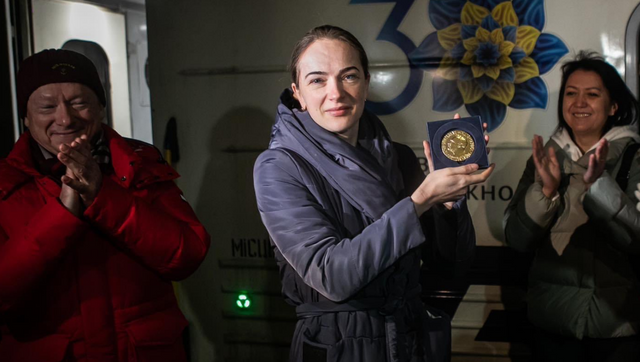Kyiv: Insisting that it could have “a cooling effect” on the atrocities committed by the Kremlin’s invading forces, a Ukrainian Nobel Peace Prize winner has called for the expeditious establishment of a special court to try Vladimir Putin and his allies for the crime of aggression. The director of the Centre for Civil Liberties, Oleksandra Matviichuk, added that a prompt start to the war crimes trials against the Russian president and troops could save lives by discouraging Russian forces from committing additional crimes. She told the Guardian in an interview that legal action might have “a cooling effect” on the heinous human rights abuses Russian soldiers were perpetrating every day in Ukraine. If they understood they would be held accountable, some troops—possibly not all—might realise that Putin’s authoritarian regime has an expiration date, according to Matviichuk. They would learn that “I will not be able to hide under abstract Putin and perhaps I will have to be responsible for everything which I perpetrate by my own hands,” she anticipated. The CCL has advocated for democratic reform in Ukraine since its founding in 2007. In the two self-declared republics of Donetsk and Luhansk, which are ruled by Russian proxies, and in the Crimea, which Russia has annexed, more than 26,0000 war crimes have been recorded since 2014. Matviichuk, who is based in Kyiv, regularly travels to western capitals to mobilise support for closing “the accountability gap.” She supports the Ukrainian government’s plan to establish a special court to try Putin and other military and political figures for the crime of aggression, which is not admissible at the The Hague International Criminal Court. The proposal is being discussed by Ukraine’s allies, but officials say the conversation is still in its early stages. While the EU had earlier this month promised that an international centre for the prosecution of the crime of aggression headquartered in The Hague would be operational from July onward, it is still unknown where and when this evidence would be heard. In addition, Matviichuuk also encouraged western countries to concentrate more on a second aspect of the “accountability gap”: assisting the overburdened national prosecutor of Ukraine in her investigation of tens of thousands of war crimes and atrocities. She would like to see international judges and prosecutors collaborating with their colleagues in Ukraine, who are grappling with a vast and growing caseload. Andriy Kostin, the general counsel of Ukraine, announced on February 17 that his office was looking into 67,000 potential war crimes cases. “It is clear that even the best prosecutor’s office in the world could not efficiently investigate so many criminal cases, particularly during war. Who will conduct an investigation, then? said Matviichuk. She prefers that both the special tribunal and assistance for Ukraine’s domestic prosecutor be established right away rather than after the combat has ended. The world still has the “prejudice” of viewing international justice through the prism of Nuremberg trials, she said, when war criminals were tried only after the Nazi regime had fallen. When I spoke with victims, they told me that their attackers always felt very confident in their ability to avoid responsibility, so it’s crucial to create these mechanisms now. “They enjoyed impunity,” she said. She cited a survey conducted by the Kyiv International Institute for Sociology last summer, which revealed that 65.8% of participants said that Russian impunity for war crimes would be their biggest disappointment at the end of the conflict. According to Matviichuk, in addition to the crime of aggression, Putin and his group should be held accountable for war crimes, genocide, and other atrocities. She claimed that rather than being isolated incidents carried out by specific brigades, this was a decision taken at the highest levels of government in an effort to weaken Ukraine’s resolve to resist. She remarked that the cynicism and pragmatism of the policy were particularly apparent following Russia’s loss in Kharkiv and prior to the liberation of Kherson, which Russia had foreseen by destroying civilian infrastructure. “Russia attempted to use the immense suffering of the civilian population as a tool to break down the people’s resistance and occupy Ukraine,” she said. Matviichuk has worked in the human rights field for 20 years, eight of which were spent documenting atrocities in areas under Russian control, but she was not psychologically prepared for the massive invasion of February 24, 2022. The Centre for Civil Liberties (CCL), Memorial, a Russian human rights organisation, and the imprisoned campaigner Ales Bialiatski shared the 2022 Nobel Peace Prize. Violence changed people, and suffering has a very special quality, so we will never be the same as we were before the extensive invasion. You might occasionally sense that this agony has worn you down. Her organisation has long collaborated with Russian human rights advocates. “Putin is afraid not of Nato, he’s afraid of the idea of freedom, which came closer to his own borders in 2014,” she said. Human rights advocates in Russia are subject to unprecedented persecution: “Their own community places the blame on them. They are branded as “foreign agents,” imprisoned, beaten, and some of them are forced to flee the nation. Some of them have made the decision to stay until the end while they await criminal trials. “When I asked them, how I can help them in this situation, they always respond: If you want to help us, please be successful. Because democratic success of Ukraine will provide a huge impact to the chance of any democratic future of Russia itself.” Read all the Latest News , Trending News , Cricket News , Bollywood News , India News and Entertainment News here. Follow us on Facebook, Twitter and Instagram.
If they understood they would be held accountable, some troops—possibly not all—might realise that Putin’s authoritarian regime has an expiration date, according to Matviichuk
Advertisement
End of Article


)

)
)
)
)
)
)
)
)



